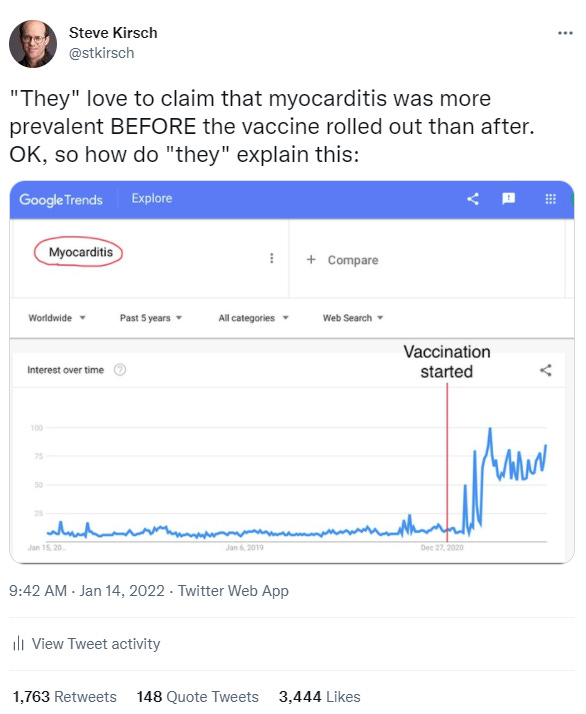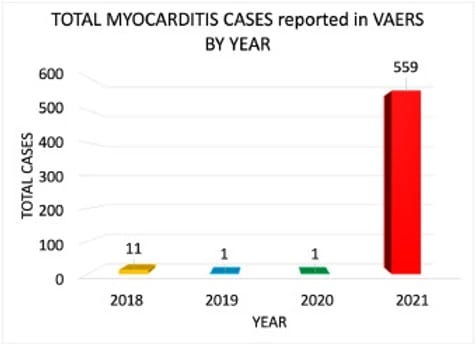Source:
https://stevekirsch.substack.com/p/the-stunning-increase-in-myocarditis
In just a few hours, my short tweet on myocarditis Google search rates went viral. Here's the reason why search rates skyrocketed (hint: it's because cases skyrocketed).
I wrote this Tweet and it blew up really fast: over 100,000 views in the first 3 hours:
Of course, there were many people who wrote something to the effect of “Um. Those are Google searches. That means people searching about it. It doesn't mean anything.”
Really?!? Nothing?!? I disagree. I think it does mean something. It confirms every other piece of data I’ve seen.
A critical thinker might ask the question, “Why would people suddenly start searching about myocarditis shortly after the vaccines rolled out and not before?”
Vaccine-induced myocarditis started making headlines starting around June 14, 2021, but it wasn’t officially confirmed even then. So that doesn’t explain the increase before that time.
The answer seems obvious: clearly, interest in the topic increased a lot shortly after the vaccines rolled out. Is there a different explanation that is more likely?
Here are some of the reasons why the interest in myocarditis went up so much:
VAERS data shows that the rates of myocarditis caused by the vaccine are far greater than the rates caused by COVID (see VaccineEssentials slide 48). According to this CDC MMWR report, “During 2020, the number of myocarditis inpatient encounters (4,560) was 42.3% higher than that during 2019 (3,205).” That’s why the bars in 2019 and 2020 below are about the same height. The incidence rate caused by the vaccine is way higher than for COVID (and it wasn’t caused by “over reporting” as I’ve explained many times before). There is no other way to explain this. This chart is from a published paper by Jessica Rose that was unethically retracted by the journal publisher because it goes against the narrative. If anyone wants to debate Jessica on this, bring it on! So you are never ever supposed to see this chart below. Nobody in mainstream medicine wants to talk about it either.
UK data shows the rates of myocarditis increased after the vaccines (see VaccineEssentials slide 54).
All of the cardiologists (people like Peter McCullough) I’ve talked to have confirmed that the rates of myocarditis have gone up after the vaccines have rolled out compared to pre-vaccine. Do you know of any cardiologists who claimed myocarditis cases went down after the vaccines rolled out?
Young kids seem to be getting myocarditis regularly now whereas you’d pretty much never see these cases before the vaccines rolled out (see VaccineEssentials slide 50)
At one private school near where I live, the rate of myocarditis after the vaccine roll out was greater than 1 in 100 teenage boys, which of course is far greater than the rate from COVID.
The CDC doesn’t want to talk about vaccine-caused myocarditis as this story about the tragic death of 26-year-old Joseph Keating. Nobody wants to touch it.
I’d love to get an explanation of this from mainstream medical doctors, but they refuse to talk to me because I don’t believe the vaccines are safe.
The evidence says that the vaccines are much more dangerous than we’ve been told
Scientists are always looking to discover which hypothesis better fits the data that is observed.
Having multiple data points gives higher confidence in the result. If 10 data points are consistent with a hypothesis, that makes it more likely that that hypothesis is the correct one.
In the current case, all the data I’m aware of is consistent with the hypothesis that the vaccines are super dangerous and doesn't comport at all with their hypothesis that the vaccines are perfectly safe.
Is there credible conflicting data?
If anyone would like to show me evidence of how the actual myocarditis rates plummeted after the vaccine rollout, please let me know and I’ll list that here.
Or if you have a better explanation of why the interest in myocarditis went up after the vaccine rollout, please let me know in the comments.



No comments:
Post a Comment
Note: only a member of this blog may post a comment.